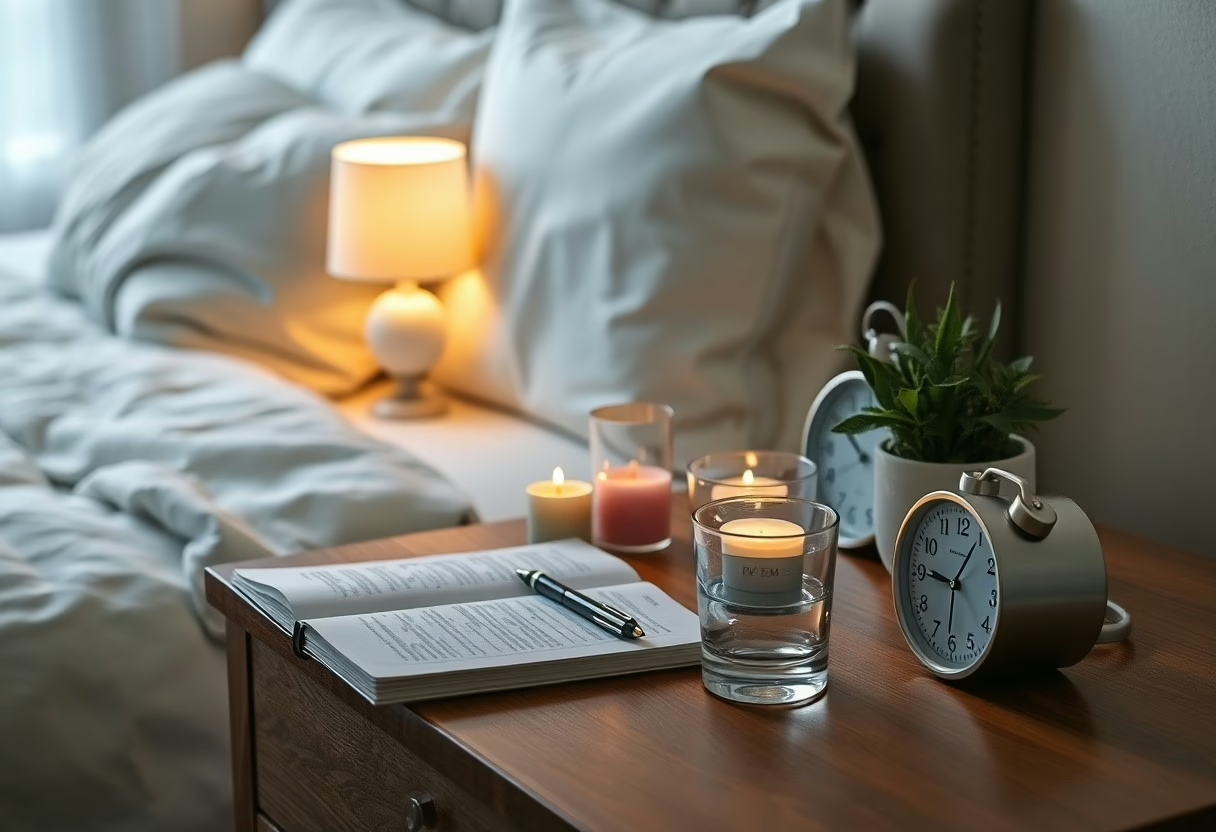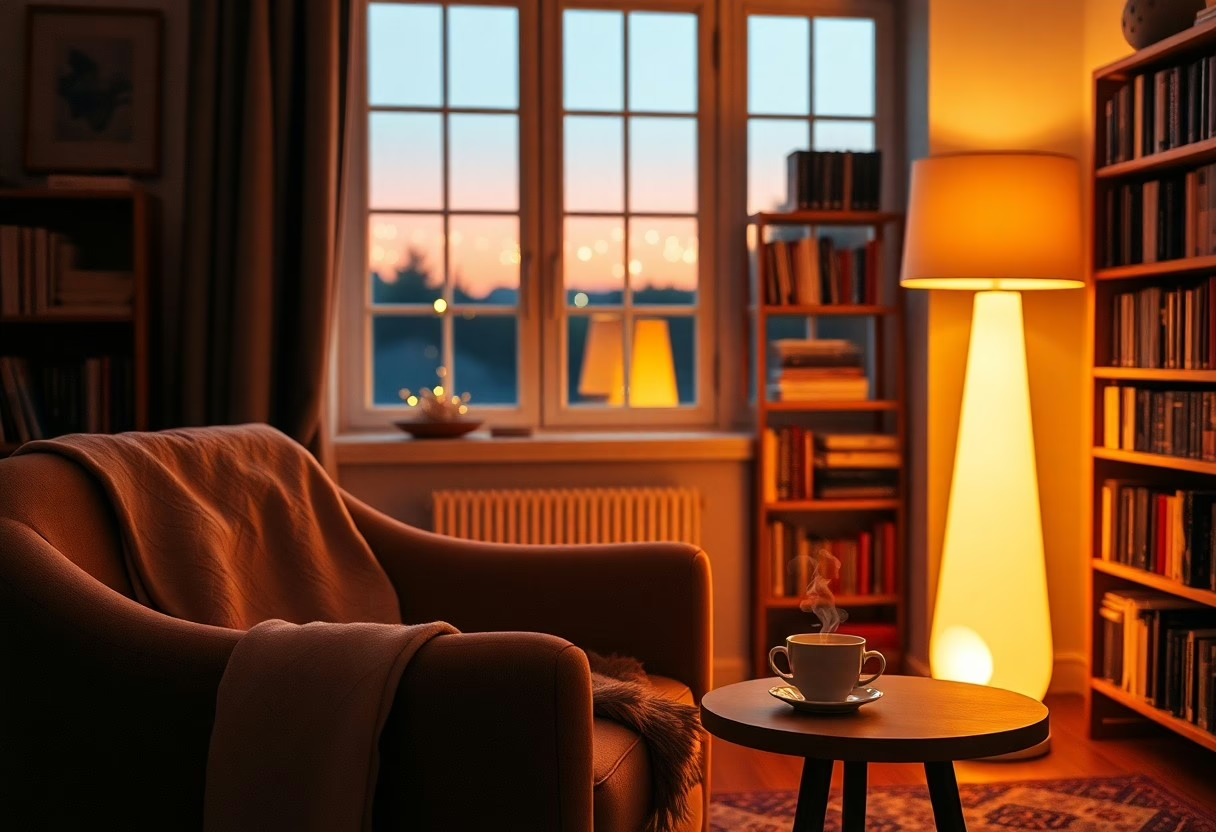Just when you think your day is winding down, it’s necessary to establish a calming evening routine that can truly restore your energy and mindset. By incorporating mindful practices and relaxation techniques, you can create a personal sanctuary that prepares you for a restful night’s sleep. In this guide, you’ll discover effective strategies to transform your evenings into a soothing ritual that promotes well-being and rejuvenation.
Designing an Inviting Atmosphere
Creating a soothing environment is imperative for a calming evening routine. This atmosphere not only promotes relaxation but also signals to your body that it’s time to wind down. Incorporating elements such as comfortable furnishings, cozy textiles, and personal touches can transform your space into a serene retreat. Consider decluttering your area to minimize distractions and enhance your sense of tranquility.
Utilizing calming colors and scents can significantly enhance your evening relaxation. Soft, muted tones like pale blues, greens, and earthy neutrals promote serenity and comfort. For scents, essential oils such as lavender, chamomile, and bergamot can create an inviting ambiance. Diffusing these scents or using scented candles not only elevates your space but also encourages mindfulness.
Opting for gentle lighting is key to achieving a calming atmosphere. Avoid harsh overhead lights in favor of warmer, softer options like floor lamps or string lights. Dimmable fixtures allow you to adjust the brightness gradually, helping your body signal that it’s time to relax. Warm-toned bulbs provide a comforting glow, reducing blue light exposure that may interfere with sleep cycles.
Crafting a Relaxing Ritual
Building a calming evening ritual involves weaving together elements that foster tranquility and restore your energy for the night. Start by setting a regular time to unwind so your body knows when to expect rest. Engage in activities that bring you peace—be it reading, sipping herbal tea, or journaling.
Incorporating mindful breathing techniques invites a deeper connection to your body and thoughts, effectively calming the mind. Focus on taking slow, deep breaths, inhaling through the nose and exhaling through the mouth. Simple techniques like the 4-7-8 method, where you inhale for four counts, hold for seven, and exhale for eight, can enhance relaxation and prepare your body for sleep.
Gentle movement and stretching can be transformative in a calming evening routine, promoting physical relaxation and mental clarity. Incorporating just 10-15 minutes of slow stretches or a serene yoga practice enhances blood circulation and releases built-up tension in your muscles. Techniques like child’s pose, seated forward bends, or gentle spinal twists encourage physical ease and provide an opportunity to reflect on your day.

Disconnecting From Digital Noise
Creating a tech-free zone at evening time allows you to shift your focus inward, reclaiming precious moments of clarity and peace. Reducing screen time helps lower cortisol levels, ultimately promoting a more restful atmosphere conducive to relaxation. By eliminating the incessant pings and notifications that often invade your tranquility, you pave the way for deeper introspection and improved sleep quality.
A tech-free zone serves as a sanctuary for your mind, allowing you to disconnect from digital distractions. Engaging in this practice can significantly decrease stress and anxiety as you create space for mindfulness and creativity. Research indicates that limiting screen exposure before bedtime promotes better sleep hygiene, ultimately resulting in improved cognitive functioning during the day.
Setting boundaries with devices starts with intentional decision-making. Consider implementing a ‘device curfew’ by putting your phone down one hour before bedtime or using apps that limit screen time. Setting up a physical space, like a charging station outside your bedroom, encourages you to disconnect from devices when it matters most.
Cultivating Restful Habits
Habits play a vital role in shaping how restorative your evenings can be. By intentionally incorporating restful practices into your routine, you can significantly enhance your sense of calm as the day winds down. Whether it’s practicing mindfulness, engaging in gentle stretches, or creating a serene atmosphere, these transformative habits guide your body and mind toward relaxation.
Your choice of evening foods can greatly influence your sleep quality and overall wellbeing. Opt for light, nutritious snacks that promote relaxation, such as chamomile tea, bananas, or almonds, all of which contain compounds that help soothe the nervous system. Avoid heavy meals and caffeine that can disrupt your sleep patterns.
Engaging in journaling can serve as a powerful tool for promoting mental clarity and emotional balance. Recording your thoughts and feelings before bed allows you to process the day’s events, fostering a sense of closure that helps release stress or anxiety. This practice cultivates self-awareness and enhances your overall emotional health.
Embracing Consistency for Lasting Change
Consistency serves as the bedrock of any healthy evening routine, enhancing the restorative benefits for your body and mind. By sticking to a predictable pattern, you create an environment that signals to your brain that it’s time to wind down, facilitating relaxation and effective sleep.
Your personalized routine should resonate with your unique preferences and lifestyle. Start by identifying activities that soothe you, whether it’s reading, meditating, or engaging in gentle stretching. Design a sequence that flows naturally, considering timing to avoid feeling rushed.
Your evening routine doesn’t have to be static; flexibility allows you to optimize your winding down process based on varying schedules and energy levels. On busier days, consider condensed versions of your routine that still incorporate essential calming activities. Designate specific “core” elements, such as a cup of herbal tea or a few minutes of journaling, that remain constant regardless of the day’s demands.
Conclusion
Now that you know how to create a calming evening routine that restores you, take the time to implement these practices consistently. By prioritizing relaxation and self-care, you can improve your sleep quality, reduce stress, and foster a sense of tranquility. Consider incorporating activities that resonate with you, such as gentle stretching, reading, or mindfulness exercises. With dedication and patience, you’ll be able to cultivate a routine that nurtures both your body and mind, leading to a more balanced lifestyle.


